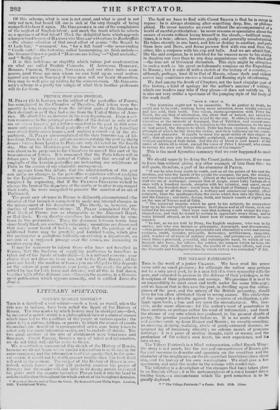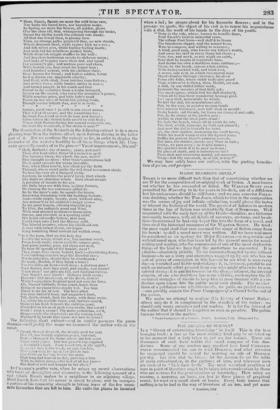THE VILLAGE PATRIARCH *.
This is the work of a junior CRAHBE. We have read his severe verse with no small pleasure ; for although the author may perhaps not be a wry great poet, he is a man full of a stern sympathy with the poor, and animated to passion in the defence of their privileges, in the description of their privations and wrongs. We presume it is next to an impossibility to meet verse and truth under the same title-page; and we lament that in this case the poet, in dwelling upon the unhap. piness of the poor, and the misery of the British peasantry, should have far too often attributed them to wrong causes. His vindication of the pauper is a diatribe against the progress of civilization, a phi- lippic upon trade, a hue and cry upon the manufacturer. We, how- ever, make some allowance for the author's want of penetration in these matters, or perhaps rather his want of information ; and thank the chance at any rate which has produced, in the present dearth of poetry, the genuine production before us. It is no cento of shreds aixi piiches made up from BvitoN and SCOTT; no sweetly-sounding, no mutating, dancing, waltzing, circle of gaudy-coloured stanzas; no ignorant lay of imaginary chivalry ; no solemn march of pompous nothings : it is a piece of sterling thought, right or wrong, and the production of the writer's own heart, his own experience, and his own views.
The Village Patriarch is a blind octogenarian, called Enoch Wray: the story is not much, but the av and circumstances of Enoch give the poet occasion to describe and speculate on the condition and the character of his neighbours, on the changes that have taken place about him, and the history of his own recollections. We shall give a few specimens, and refer the reader to the volume with confidence. The tbllowino is a description of the changes that have taken place in an English village; it is the metamorphosis of a rural hamlet into a trading town,—a circumstance which the poet conceives is to be greatly deplored.
* " The Village Patriarch :" a Poem. Bull. 1829. 12ino.
" Here, Enoch, flaunts no more the wild briar rose, Nor basks the lizard here, nor harmless snake.
In Spring, no more the broom, all golden, glows O'er the clear rill, that, whimpering through the brake, Heard thy Blythe youth the echoing vale awake.
All that was lovely then, is gloomy now.
Then, no strange paths perplex'd thee, no new streets, Where draymen bawl, while rogues kick up a row ; And fish-wives grin, while fopling fopling meets; And milk-lad his rebellious donkey beats, While dwarfish cripple shuffles to the wall ; And hopeless tradesman sneaks to alehouse mean; And imps of beggary curse their dad, and squall For mammy's gill ; and matron poor and clean, With tearful eye, begs crust for lodger lean ; And famished weaver, with his children three, Sings hymns for bread ' • and legless soldier, borne In dog-drawn car, imploreth charity; And thief, with steak, from butcher runs forlorn ; And debtor bows, while banker smiles in scorn; And landed pauper, in his coach and four Bound to far countries from a realm betrayed, Scowls on the crowd, who curse the scoundrel's power, While coachee grins, and lofty lady's maid Turns up her nose at bread-tax-paying trade, Though master bilketh dun, and is in haste. *
Scenes, rural once ye still retain sweet names. That tell of blossoms, and the wandering bee ; In black Pea-Croft no lark its lone nest frames ; Ilalin-lireen the thrush bath ceas'd to visit thee ; \\ lion shall Bower-Spring her annual corncrakb see,
=
Or start the woodcock, it' storm is near?"
The description of the Sabbath in the following extract is in a more pleasing tone than the furious attack upon furimas driving in the latter part of it. But we continue the extract so far, in order to display the character of the writer's hostility to all those things which Mr. C013- BETT generally speaks of in the phrase" Vaust improvements, Ma'am!'
" Hail, Sabbath ! day of mercy, peace, and rest !
Thou o'er loud cities throw'st a noiseless spell. The hammer there, the wheel, the saw, molest.
Pale thought no more : O'er trade's contentious hell
Meek quiet spreads her wings invisible.
But, when thou com'st, less silent are the fields Through whose sweet paths the toil-freed townsman steals. To him the very air a banquet yields. Envious, he watches the pois'd hawk, that wheels His flight on chainless winds. Each cloud reveals A paradise of beauty to his eye.
His little boys are with him, seeking flowers, Or chasing the too venturous gilded fly.
So by the daisy's side, he spends the hours, Renewing friendship with the budding bowers : And—while might, beauty, gond, without alloy,
Are mirror'd in his children's happy eyes—
In his great temple, offering thankful joy To Him, the infinitely great and Wise, With soul attuned to nature's harmonies, Serene, and cheerful, as a sporting child.
His heart refuses'arto believe, that man
Could turn into a hell the bloomy wild, The blissful country, where his childhood ran A race with infant rivers, ere began King.humbling blind misrule his wolfish sway.
" is it the horn, that on this holy day Insults the songs, which rise, like incense sweet, From lowly roots, where contrite sinners pray, And pious rustics, poor, yet clean and neat, To hear th' apostle of the hamlet, meet ?
They come, they come, behold, hark I—thundering down, Two headlong coaches urge the dreadful race; Wo to outsiders, should they he o'erthrown; Be ready, Doctor, if they.hreak a trace Twelve miles an hour—well done ; a glorious pace !
Poor horses, how they pant, and smoke, and strain !
..;,"hat then ? our jails are full, and England thrives.
Now Bomb ! now Bomb ! Defiance leads again ; I I tirrah ! Bill Breakneck, or the Devil, drives!
Whip !—populous England need not care for lives.
Oh, blessed Sabbath, to the coach-horse thou Bringest no pause from deadly toil. For him There is no day of rest. The laws allow His ever-batter'd hoof, and anguished limb, Till, death-struck, flash his brain, with dizzy swim. I.o, while his nostrils flame, and, torture-scor'd, Quivers his flank beneath the ruthless goad, Stretch'd on his neck each vein swells, like a cord !
1-lark ! what a groan I The mute pedestrian, ao'd, Stops—while the steed sinks on the reeling road, Murder'd by hands that know not how to spare !
The following short extract—and in similar passages the poem
abounds—will justify the name we honoured the author with in the outset.
" Proud, though despk'd, she sternly paid for rent Her all, her weekly eighteen pence, and died, Rather than quit the home where she had spent Twice forty years. Her last lamed rug supplied • \ fortnight's food. None beard her, if she sighed; Nolle sai; her, if she wept; or saw, too late, 'Hist !ears were ice upon her lifeless face. icr Bible on her lap, before the grate That long had known no tire, gnawing a lace With toothless gums,—the last of all her race— She died of cold and hunger in her chair."
In CRABEE'S gentler vein, when he mixes up moral observations with traits of description and character, is the following account of a visit which Enoch makes to a neighbour in an adjoining village. Blind Enoch feels that his career is about to close, and he occupies • a portion of his remaining strength in taking leave of the few inani-
mate favourites that are left to him. He visits the places he haunted when a lad ; he gropes about for his favourite flowers ; and in the passage we quote, the object of his visit is to renew his acquaintance with a dial, the work of his hands in the days of his youth.
" Deep in the vale, where, known to humble fame, Poor Enoch's rival in immortal verse, The village Poet lives—well skill'd to frame The beauteous slipper, and the sonnet terse, Wise to compose, and willing to rehearse; A kind, good man, who knows our father's worth, And owns his skill in every thing but rhyme ; Sage, too, and meek, as any Wight on earth, Save that he laughs at transitory time, And deems his own a deathless name sublime ;— There, by the brook, cowers a low edifice, With honeysuckled wall, and ivied roof, A warm, sate nest, in which two mortal mice
Mi!,iit slumber through existence, far aloof
From city folks, whose sickly looks give proof That, whatsoe'er is theirs, thou, Health, art not.
A dial, by our skilful father made, Instructs the inmates of that little cot ; The masterpiece, which first his skill display'd, When all to him their wondering homage paid.
I,o! on a visit, mournfully he wends, To feel the dial, his acquaintance old ; But, by the way, in pensive musing bends • O'er ancient landmark, now half sunk in mould : Shake hands, sad friends, for times are changed and cold; But, lo, he enters at the garden gate; Awhile in chat the rival poets stand : lie feels the bench, where oft in youth lie sate, The shed, which, long ago, he built and phoned ; And now the dial is beneath his hand.
Ala the slow shadow, measuring the swift boors, While his touch wanders o'er the figured plane.
Baffles his patient finger's cunning powers; But man, the shadow, mocks grey Time in vain ; Dusky, we pass away ; he laughs amain; His sportive trade it is to mow us down ; He plays at death, and is industrious too I
Thou dark and sorrowing mortal, yet u II mown,
Weep—but thy sun-clock, as of old, is true I"
We may here safely leave our author, with the parting benedic- tion of go on, and prosper.



















 Previous page
Previous page